SAN SALVADOR, EL SALVADOR — “El pueblo unido, jamás será vencido” (“The people united, will never be defeated”) was the popular chant that the crowd of FMLN (Farabundo Martí National Liberation Front) supporters sang during the party’s closing rally this past Sunday January 27. Ten years ago, the guerilla’s party made history by winning the presidential elections after fighting the right-wing, U.S.-backed government in what turned out to be one of the region’s most brutal civil wars. That conflict became known for perpetuating some of the worst war crimes committed by government forces and death squads. And as Salvadorans prepare to hit the polls on February 3 for national elections, some are guided by the fears of that era.
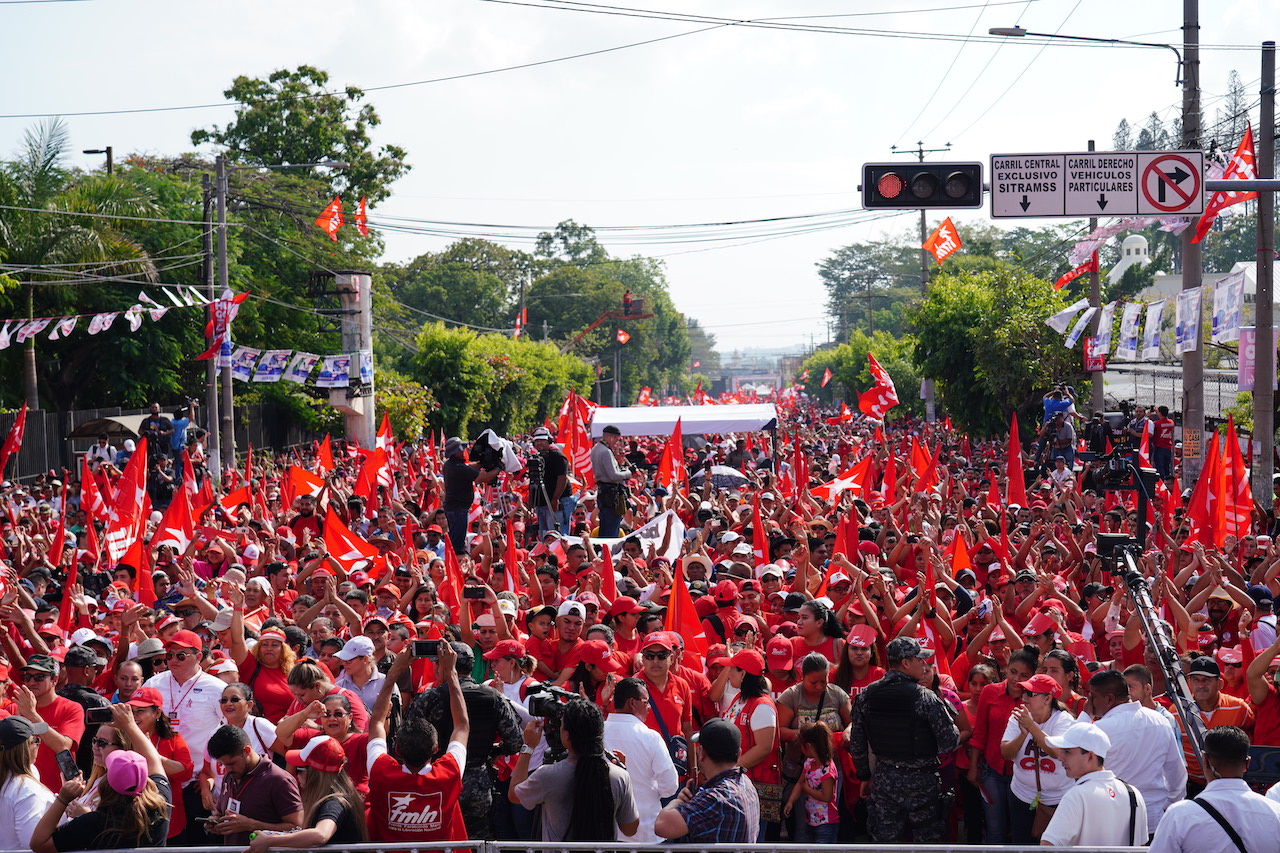

A red tide floods the streets of San Salvador during FMLN’s campaign’s closing rally last Sunday. (Photo by Francisco Lozano/Latino Rebels)
The right-wing ARENA (Republican Nationalist Alliance) party ruled during most of that civil war. ARENA founder Major Roberto D’Aubuisson is said to have been the mastermind behind the death squads, as well as the murder of Archbishop Óscar Romero (now a saint). People who were wary of the human rights abuses and corruption of ARENA are now, for the most part, disenchanted by the FMLN’s first president, Mauricio Funes, who after winning in 2009 is now living in Nicaragua under political asylum due to corruption charges. A great number of FMLN supporters have now migrated to a new party, Nuevas Ideas (New Ideas) of former FMLN member Nayib Bukele, who leads the latest pre-election polls.
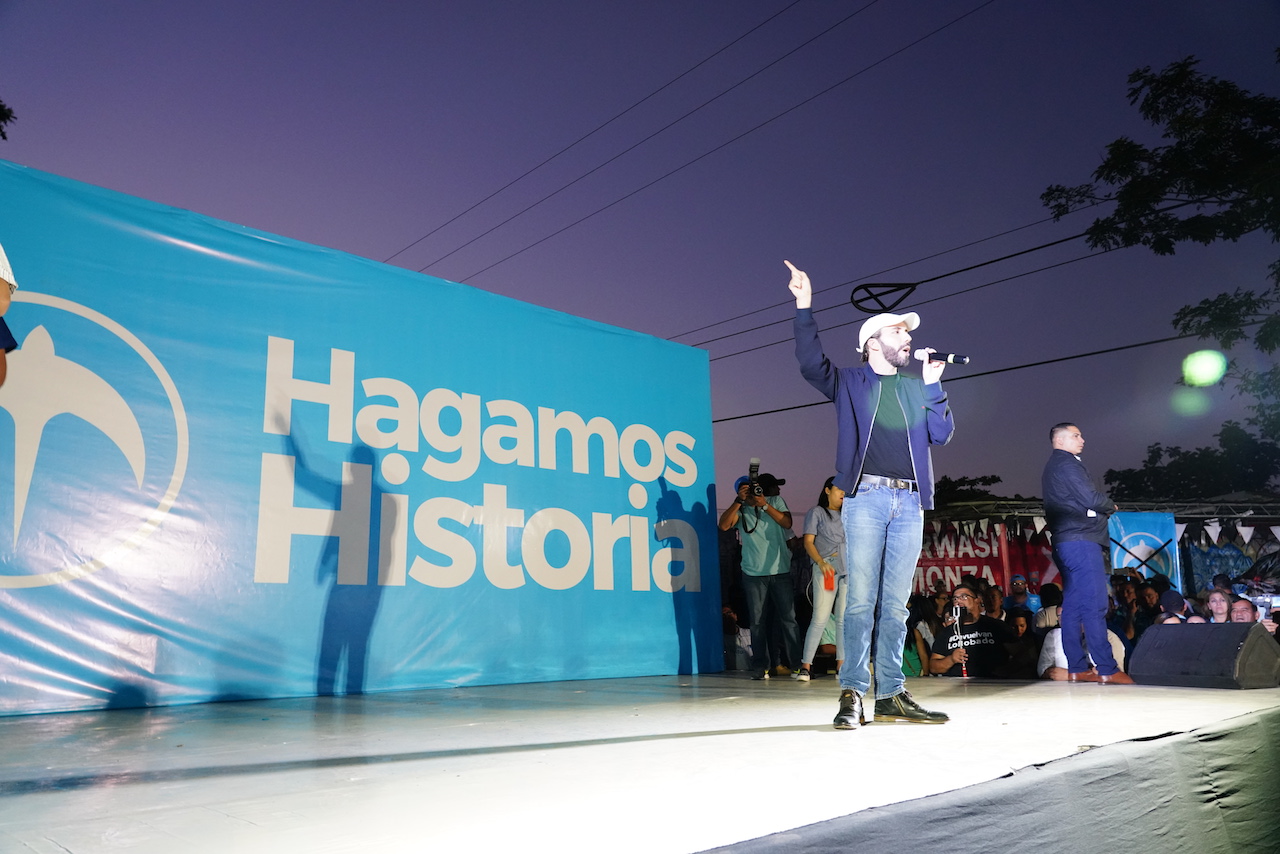

Nayib Bukele addresses the crowd during a campaign rally in El Salvador’s second largest city of Santa Ana. (Photo by Francisco Lozano/Latino Rebels)
Bukele, who parted ways with the FMLN, gathered signatures to create the Nuevas Ideas party. Running out of time to register, it is believed that when he couldn’t register the new party, he then joined a right-wing party, GANA, to secure a running spot, a move that FMLN militants have criticized.
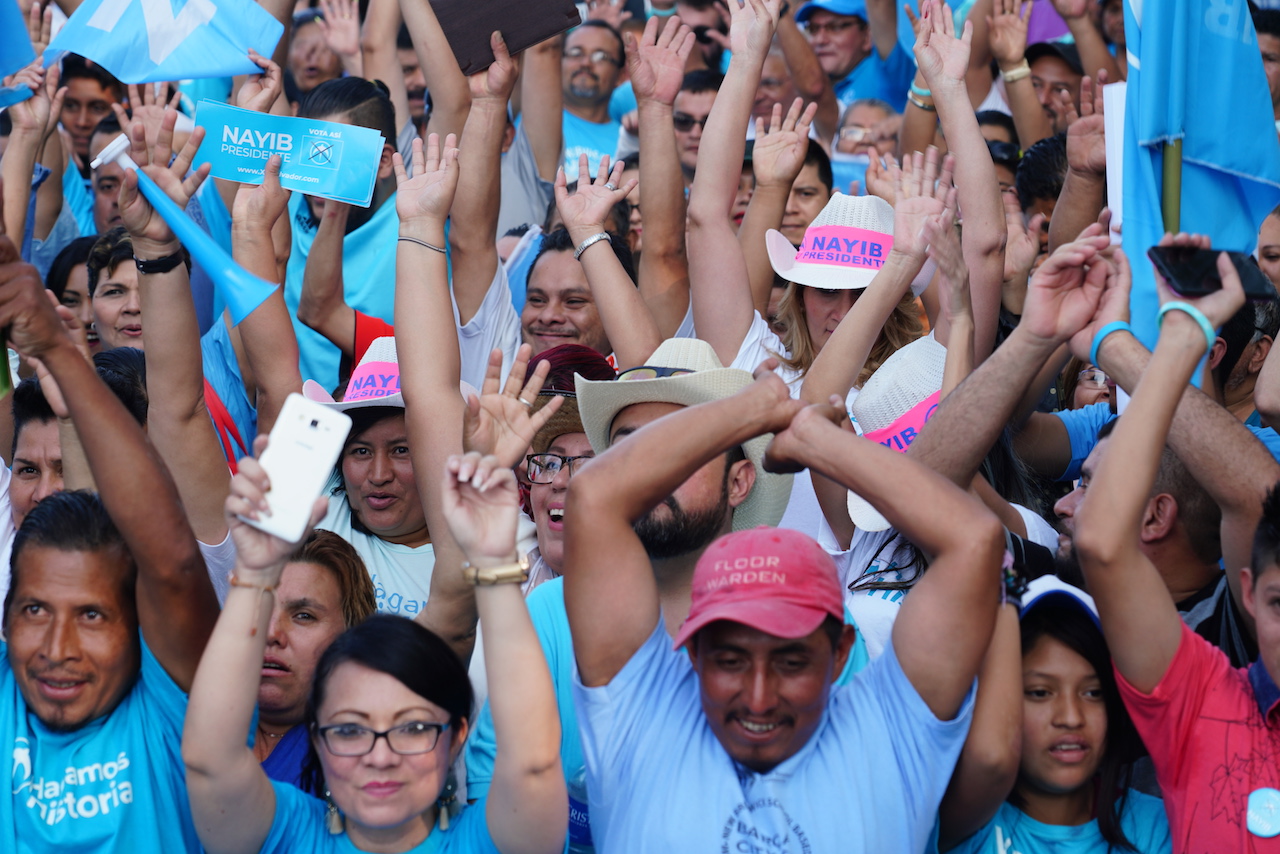

Bukele’s supporters cheer as he speaks at campaign rally in Santa Ana. Bukele leads the polls for Sunday’s elections. (Photo by Francisco Lozano/Latino Rebels)
With Bukele leading the polls, ARENA has created an alliance with three other right-wing parties: PCN (a comeback party from the late 70’s whose last president, General Carlos Humberto Romero, was removed by a coup d’etat that signaled the civil war), PDC, and DS as a way hopes to counteract Bukele’s lead.
The Issues
Bukele has gained popularity among people who are fed up with corruption and are ready for a new chapter in the war-torn country now plagued with gang violence. However, FMLN supporters credit the party for promoting freedom of speech, infrastructure progress, public transportation and education support (every year, the government has supplied children with shoes, school uniforms, and school supplies).
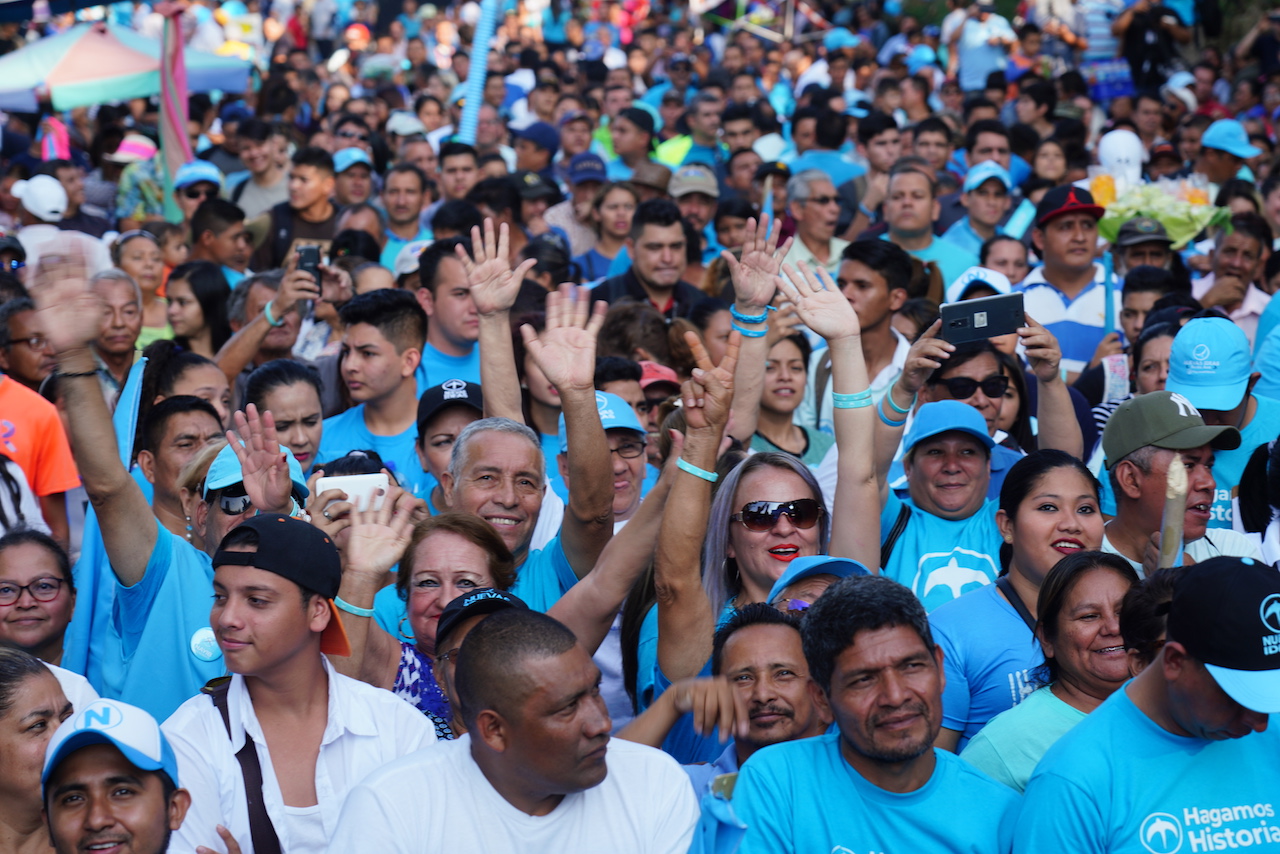

A light blue wave fills the streets of Santa Ana during Bukele’s Nuevas Ideas rally. (Photo by Francisco Lozano/Latino Rebels)
El Salvador is one of world’s most violent countries—a key factor playing out in these elections, although people do acknowledge that the country’s current president, Salvador Sánchez Cerén of the FMLN, has reduced violence in the country. Another constant issue is how university graduates and new professionals can’t find work, despite their degrees and doctorates.
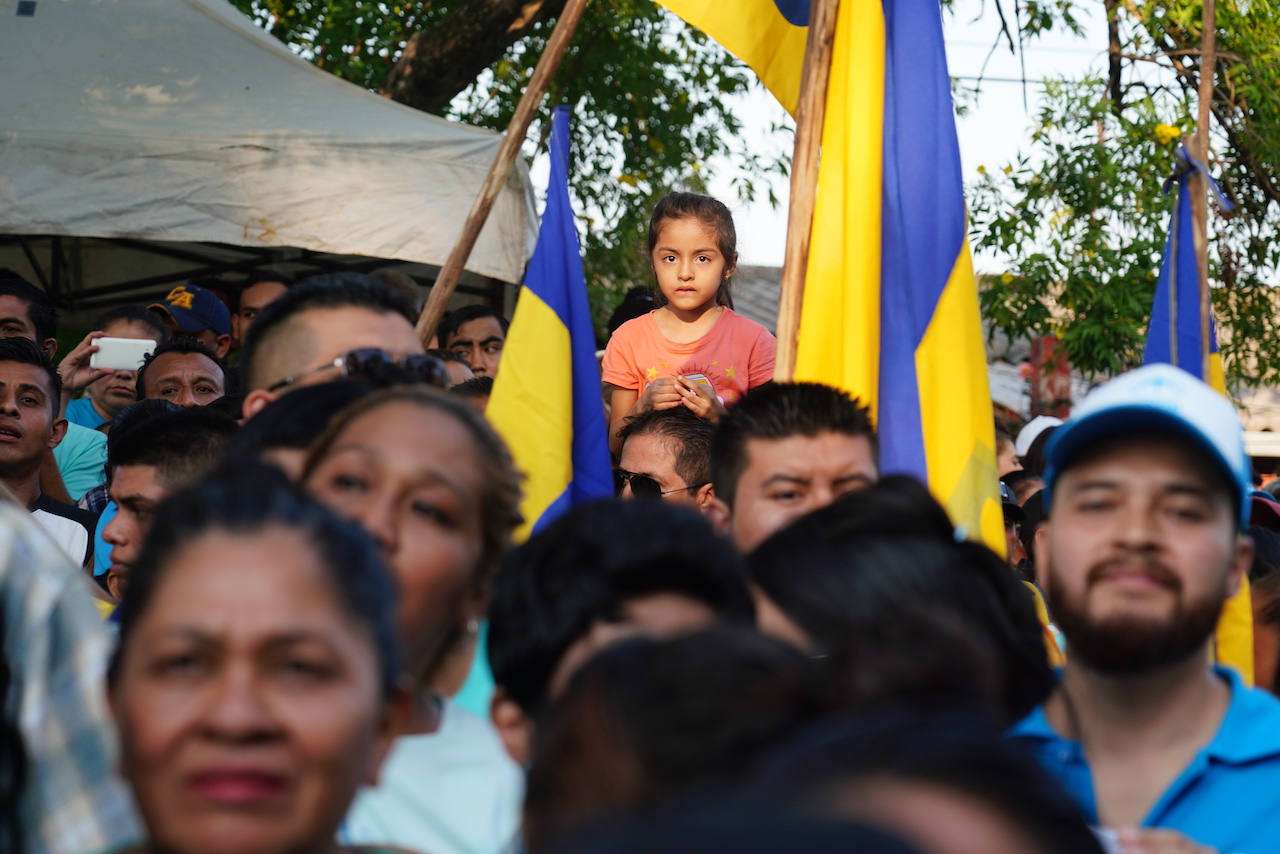

A young girl gets a higher view of Bukele during a rally in Santa Ana. (Photo by Francisco Lozano/Latino Rebels)
“As entrepreneurs, we lean towards ARENA’s Carlos Callejas. He understands that businesses generate employment. Nayib, on the other hand, promotes discontent by playing the businessman against the poor and vice versa, something that alienates the working class against the job-producing businessmen,” said an entrepreneur and businessman who asked that his identity be kept private due to safety concerns. The ARENA part has also been criticized for misappropriation of funds and stealing.


ARENA candidate Carlos Callejas campaigning in the town of Atiquizaya with his running mate Carmen Aída Lazo. (Photo by Francisco Lozano/Latino Rebels)
“The FMLN la regó [blew it],” said an agriculture engineer who also asked that his identity be kept private. “They made history by being the guerilla’s party that won the presidential elections ten years ago, only to be proven that they also were corrupt. I also sang ‘El pueblo unido, jamás será vencido’ and it gave me shivers. Now, when I hear it? I get upset [at the FMLN].”
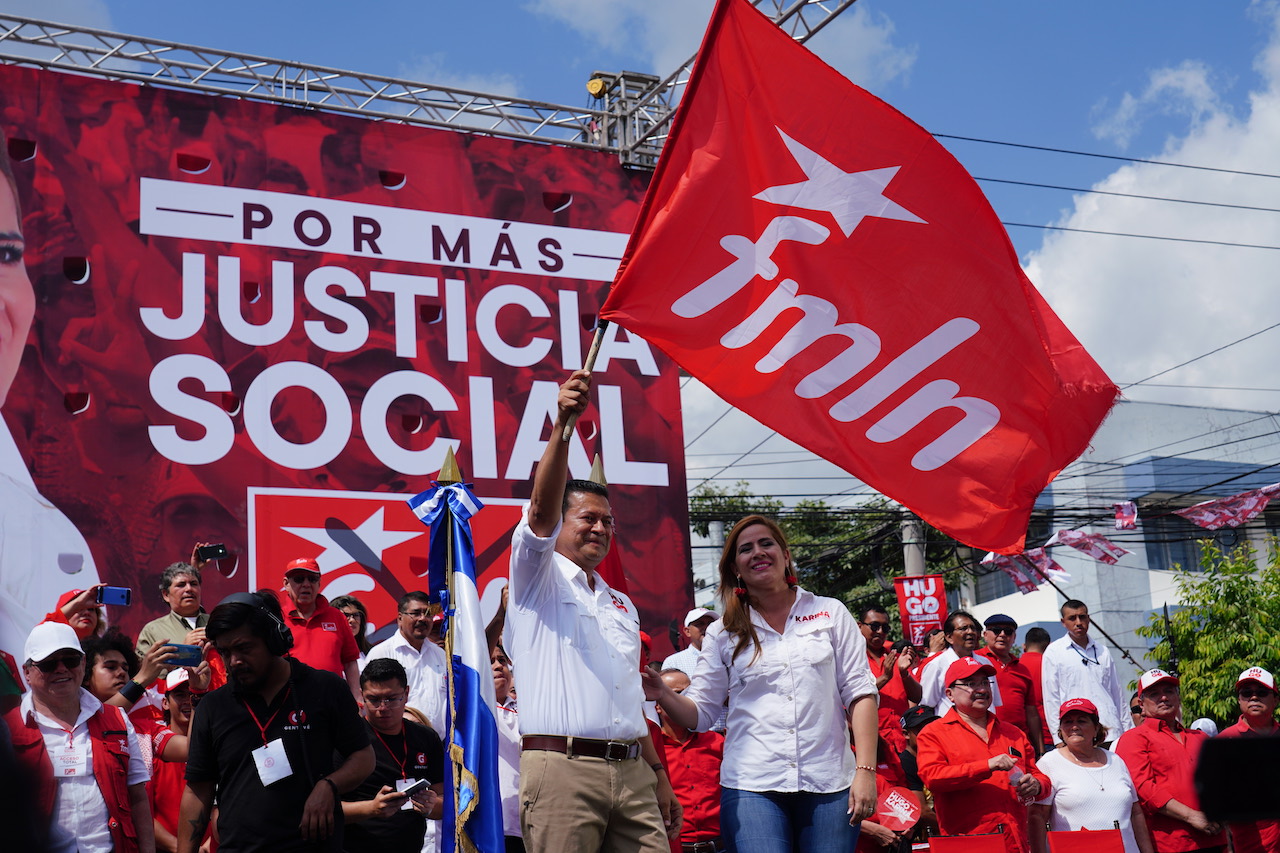

FMLN candidate Hugo Martínez waves the party’s flag during the campaign’s closing rally in San Salvador. Karina Sosa is Martínez’s running mate. (Photo by Francisco Lozano/Latino Rebels)
Shadow of the Civil War
Politics in El Salvador is dictated by the civil war. People choose their affiliation and support based on their experience of that era. However, it seems irrelevant to the new generations who have heard of the war, but didn’t live through the atrocities committed. They are disengaged from the subject, in comparison to people over 50 who endured over 12 years of a Cold War-era revolution. Back then, university and high school students led that Salvadoran revolution, a sharp contrast to today’s students.
Hoping to tap into this new generation of students, Bukele offered a promise to disenfranchised youth: The Roque Dalton incentive, where high-performing students can be sent to study new technology abroad with all expenses paid, but only if come back and work in El Salvador to propel technology. (Dalton was a revolutionary poet in the 1970s who is believed to have been executed by his own revolutionary comrades.)
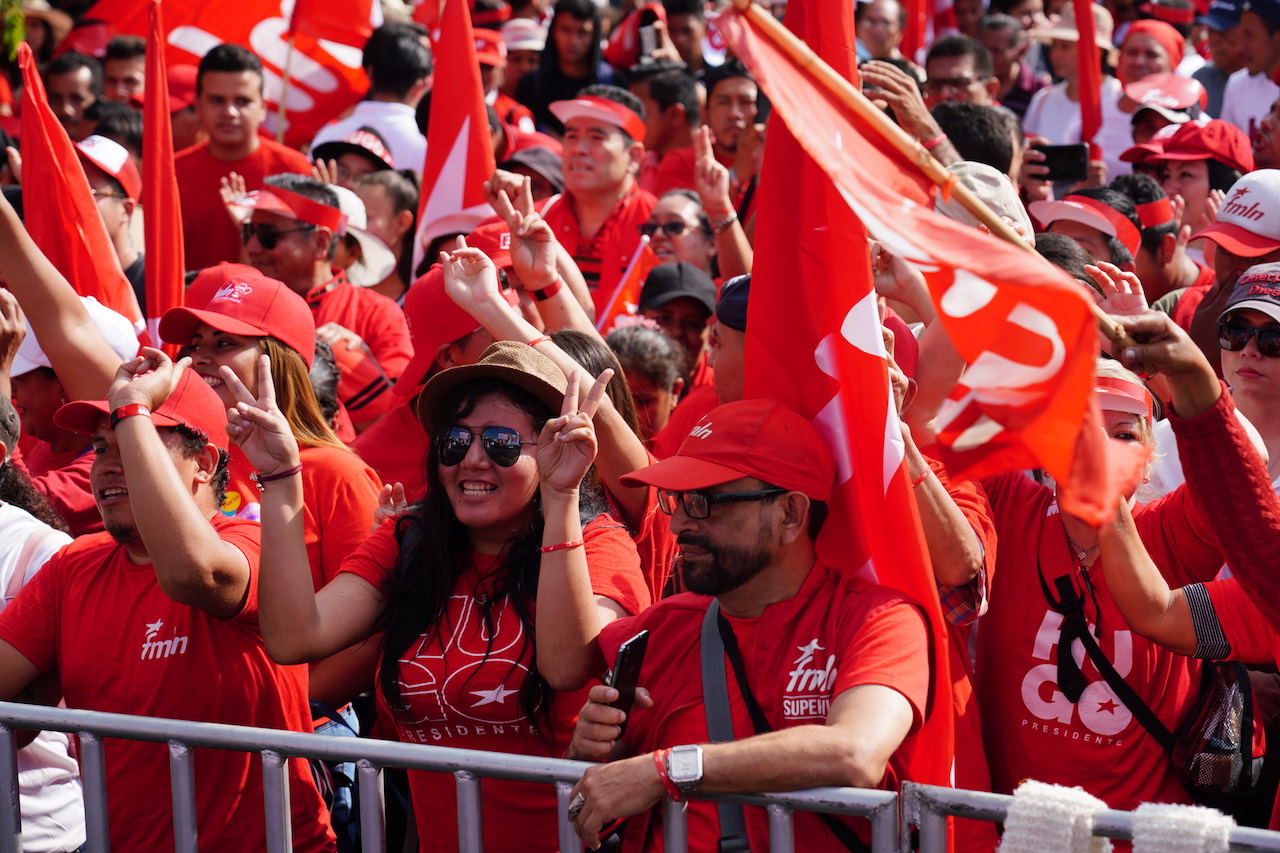

FMLN supporters give the victory sign during the campaign’s closing rally in San Salvador. (Photo by Francisco Lozano/Latino Rebels)
Bukele has also championed reform in the health care system. During his campaign, he cited that hospitals lack essentials such as stitches kits, respirators for collapsed lung patients, and that people are often waiting in emergency rooms for up to four days only to be told that there are no medications available.
“Churches have to come and feed the people waiting in the emergency rooms for more than three days at hospitals,” Bukele said during his closing rally.
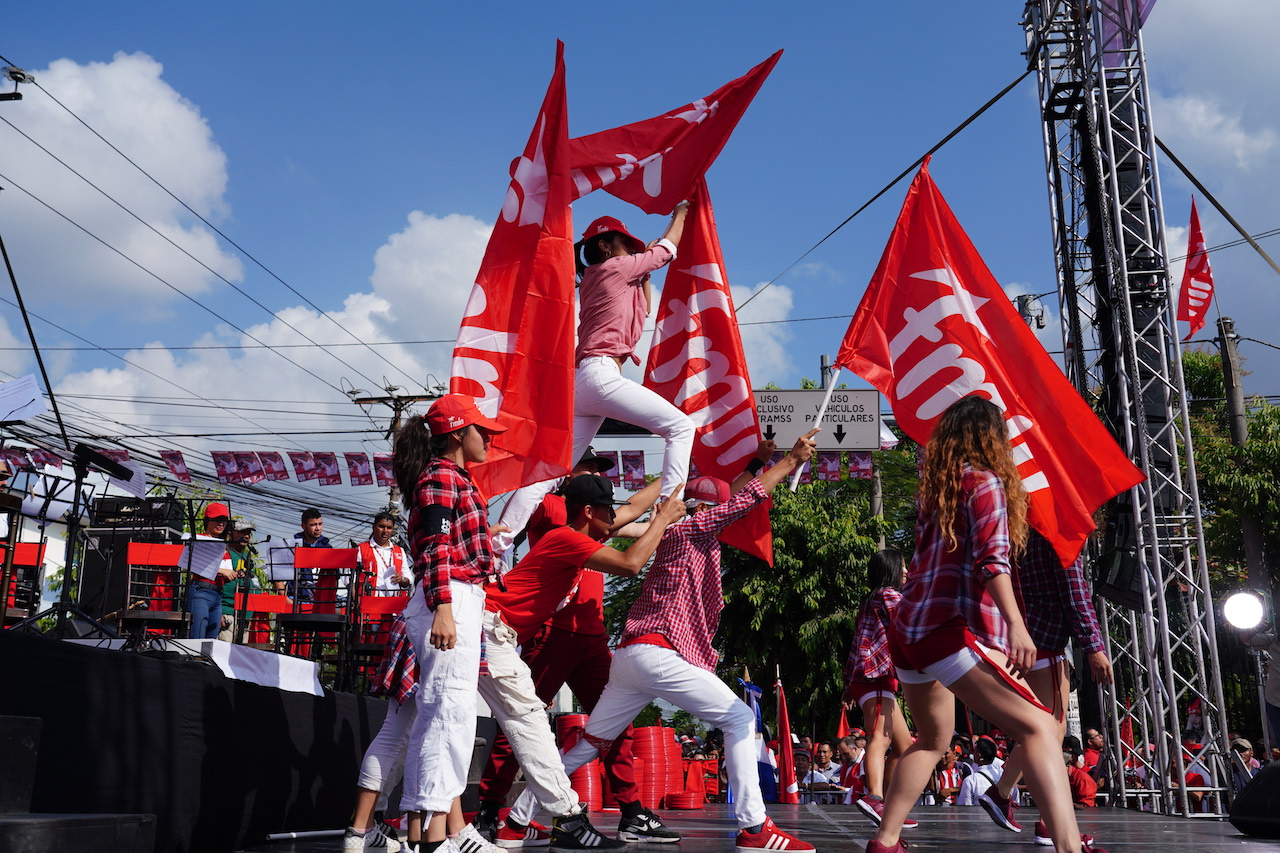

A group of youngsters perform a modern dance during the FLMN’s campaign’s closing rally in San Salvador. (Photo by Francisco Lozano/Latino Rebels)
One woman who used to work in a medical facility shared this story at the Bukele rally: “As I was doing my intern work at the San Juan de Dios Hospital, a very sickly lady came in to the emergency room. We didn’t know what was wrong with her, but we suspected the possible causes. A blood test was ordered. I couldn’t find a lancet to prick her finger nor test strips. I couldn’t latex gloves for myself. I did find the lancets and the test strips locked away [because they get stolen]. I told the lady not to fear, that she would feel a little sting as I did the test. Once she heard the sound of the lancet, she panicked and raised her arm. The lancet tore my finger. Later that day, the results came in. As we suspected, she was HIV positive. My young life ran before my eyes as I realized I could have been infected for not having latex gloves!”
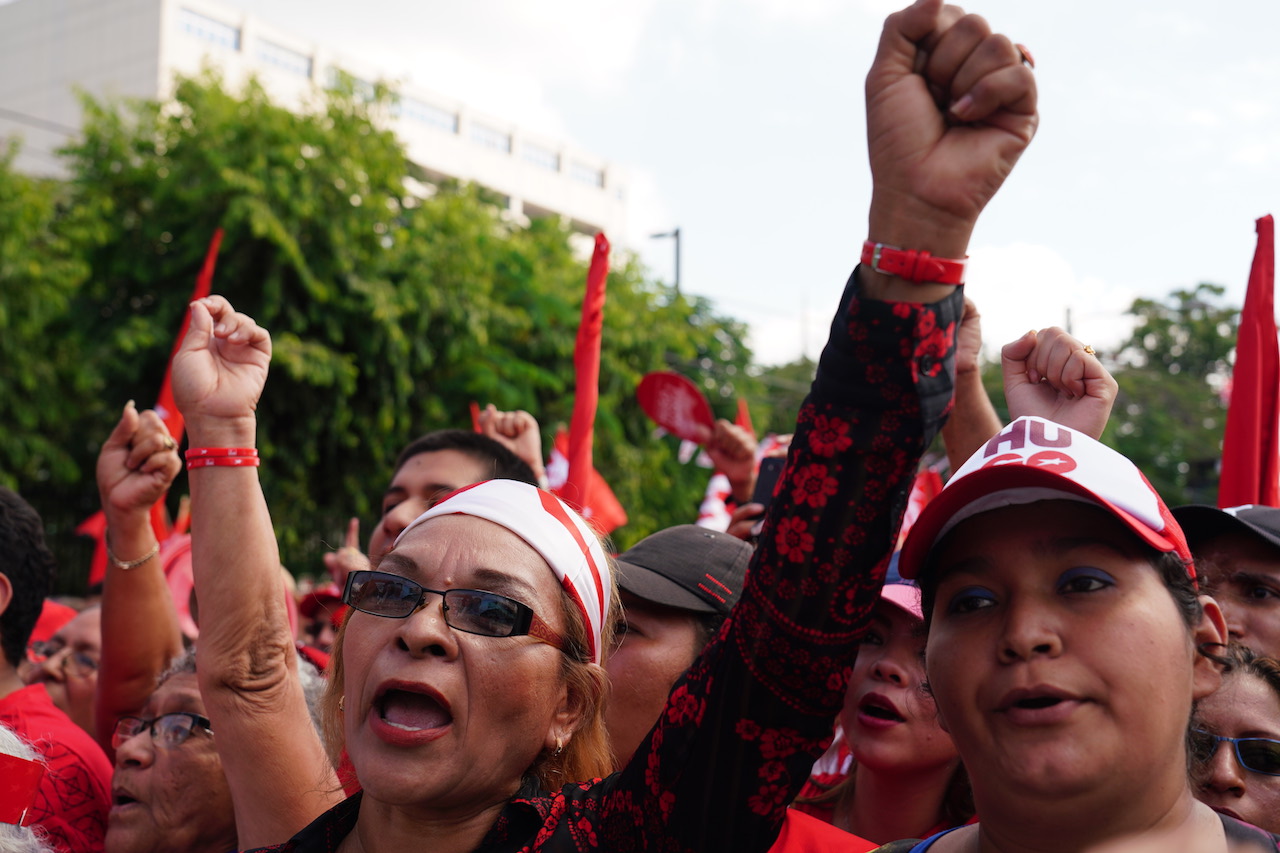

Women turn out to support the FMLN. During the civil war, many young women were militants of the guerillas fighting the ultra right-wing ARENA government’s forces. (Photo by Francisco Lozano/Latino Rebels)
New Form of Revolution
If elected, Bukele, 37, would be the country’s youngest president ever. A businessman who successfully ran two major cities as mayor, including San Salvador, Bukele is seen as a very down-to-earth politician who wears skinny jeans and identifies with the people. He also promised to bring back the nearly extinct and once blooming coffee industry.
“Cristiani se cagó en la industria del café” (Cristiani, an ARENA ex-president, crapped all over the coffee industry”), he said during the Sunday rally.
Meanwhile, Bukele’s Nuevas Ideas party slogan to ARENA is “devuelvan lo robado” (“give back what you stole”).
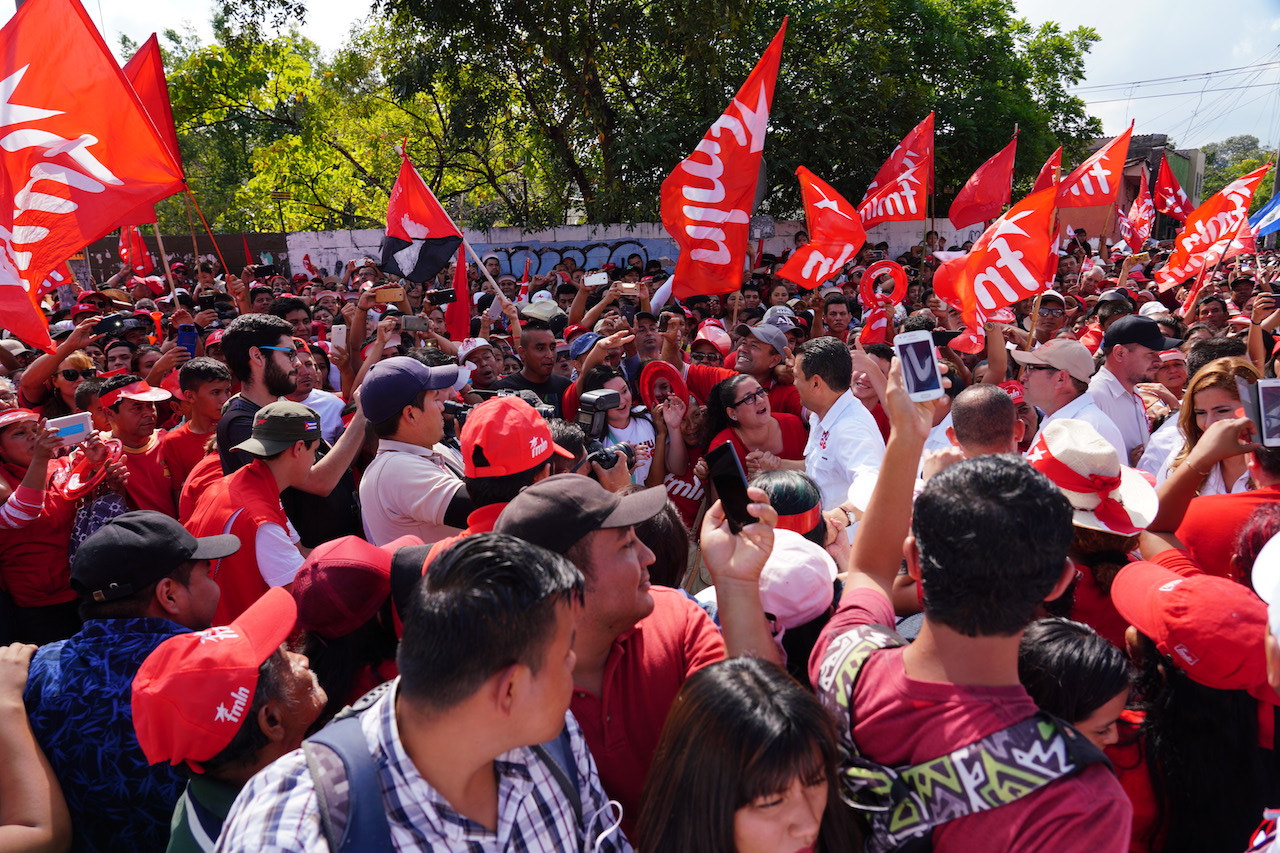

FMLN candidate Hugo Martínez walks among a ‘red sea’ in San Salvador. (Photo by Francisco Lozano/Latino Rebels)
Hugo Martínez, an ex-foreign minister, is the FMLN candidate. Pre-election polls have him running in third place. During the closing campaign rally, as he pointed to the red tide of thousands of people attending the rally, he said: “These are the real polls, all of you here by the thousands.”
He also vowed to lead in a way that will honor the many women and men who died during the revolution.
“People who didn’t live here don’t understand the progress that the FMLN has done. As a teacher, I have seen the support for schools, for children who used to come to school barefoot and are now given a pair of shoes, a uniform and school supplies,” said a teacher who attended the rally and asked not to be named for safety concerns. “Also the support for schools and the staff, anyone who hasn’t lived here can’t tell me otherwise!”
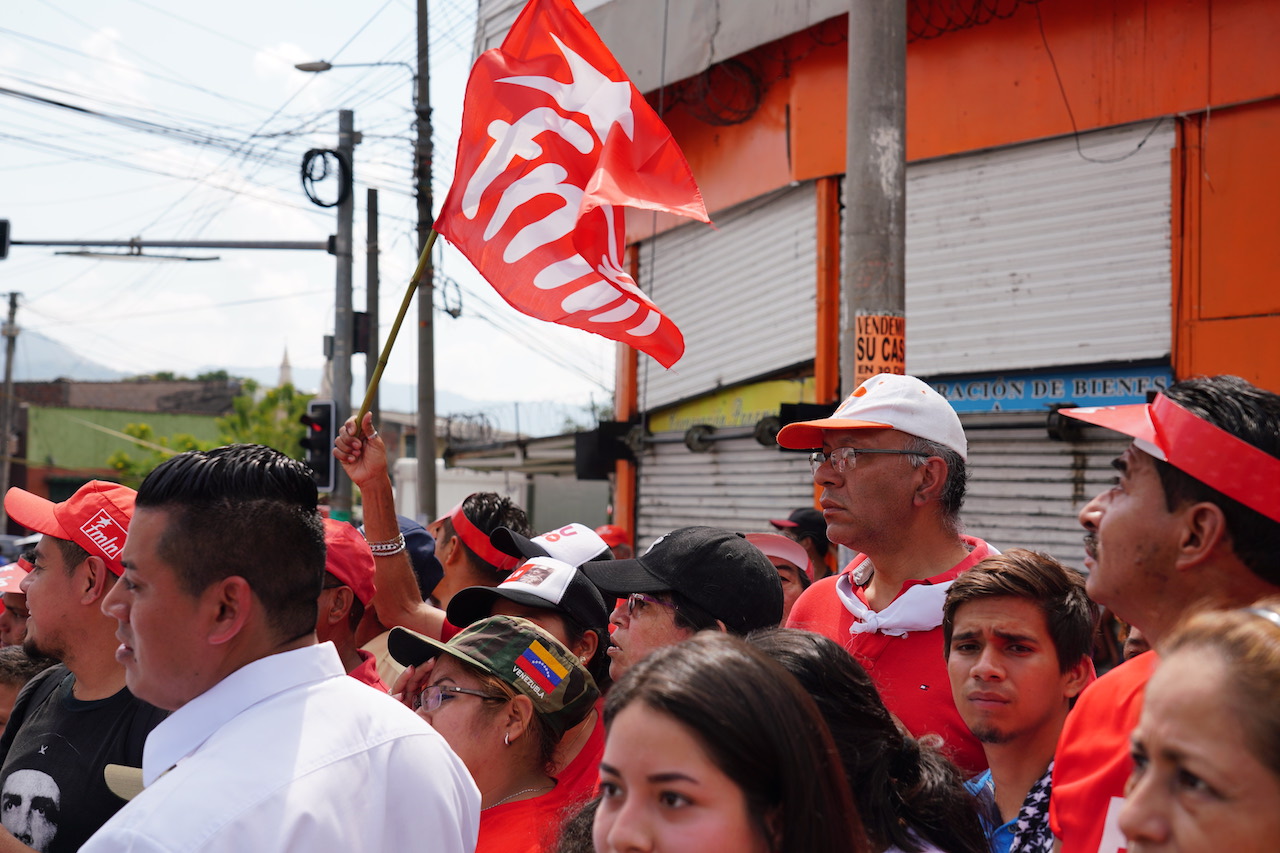

A woman wearing a hat with the Venezuelan flag during the FMLN rally in San Salvador. (Photo by Francisco Lozano/Latino Rebels)
Pre-election polls have Callejas, the ultra-right wing ARENA candidate who is also a businessman, running in second place. ARENA’s slogan is “Vote for Jobs.” Opponents have criticized Callejas for not having a concrete government plan. He vows to reclaim the seat that his party lost 10 years ago in an unprecedented and historical left-wing victory.
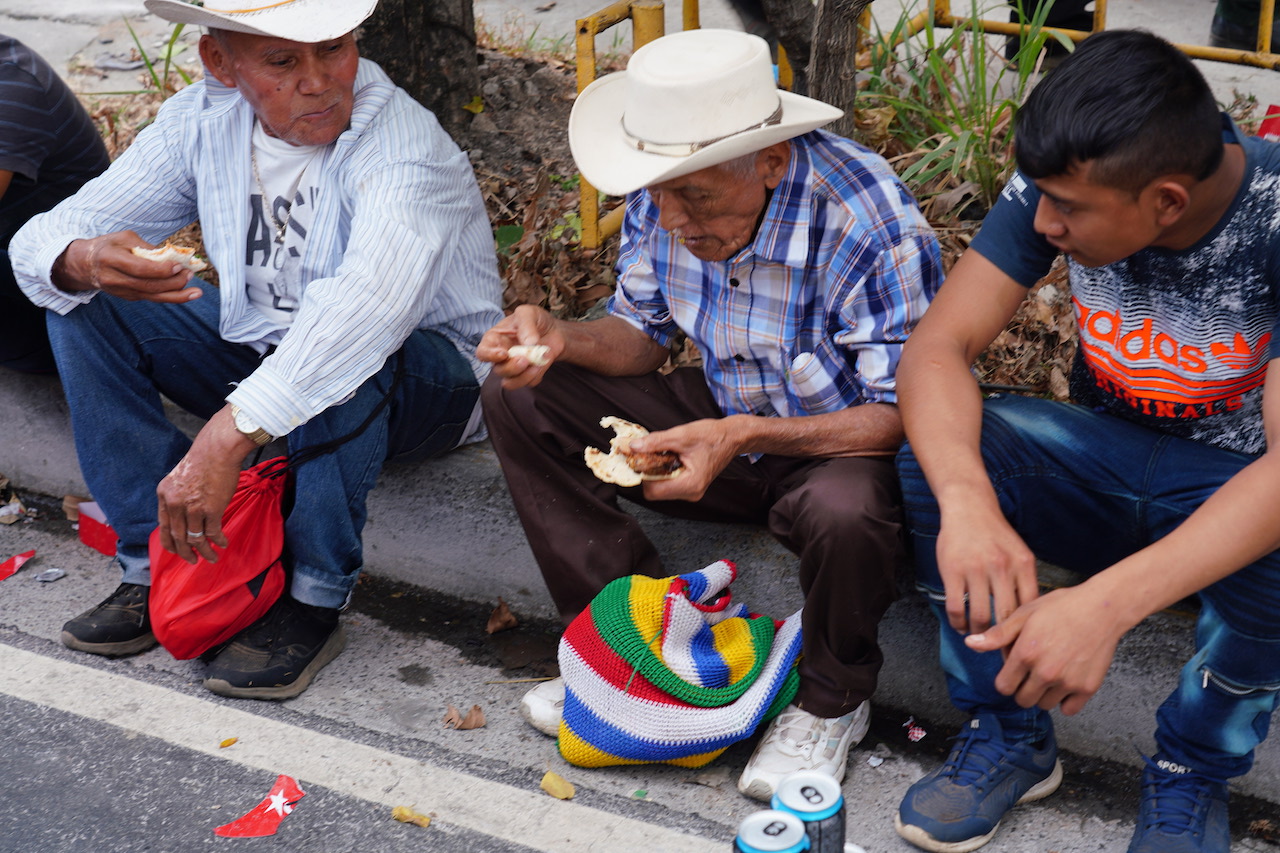

Campesinos (peasants) eat their lunch out of their ‘matatas’ (lunch bags) as it is their tradition to bring their lunch to the fields. Campesinos turned out for the FLMN rally in San Salvador. (Photo by Francisco Lozano/Latino Rebels)
As Venezuela faces challenges to its democracy due to the perpetual U.S. intervention, the elections in El Salvador also remind people of the fragility of the region’s democracy. Some speculate that the U.S. knows who the next president will be in any Latin American country before the elections are held. The U.S. intervention in El Salvador during the civil war caused a wave of immigration to —ironically— the United States. The same is true now, as caravans make headlines and people continue making their way north.
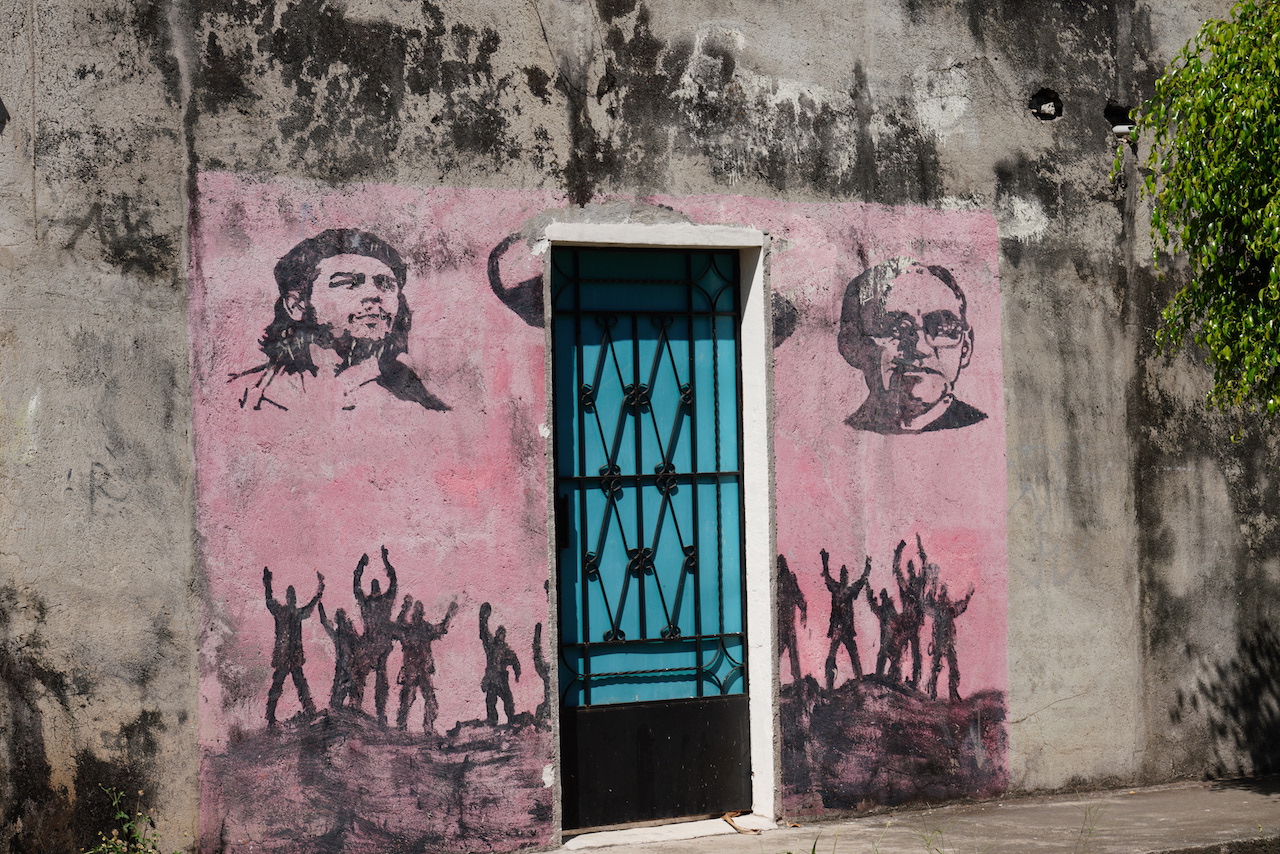

A mural in the city of Chalchuapa depicts the revolution. (Photo by Francisco Lozano/Latino Rebels)
Can the elections be a new form of revolution? Or in a country filled with intellectuals and revolutionaries as well as dictators and corruption, are elections part of the continuity of the status quo?
That is the question.
***
Francisco Lozano is a freelance news photographer based in Los Angeles. You can follow him @FrancisLozano7.



Congratulations, good reportage, waiting to see the election results.
Hoping Nayib Bukele became the new elected President of El Salvador.